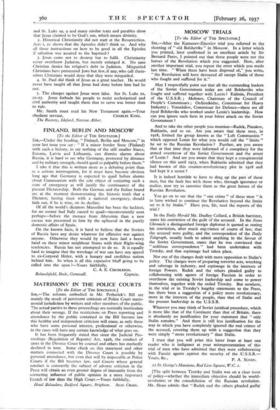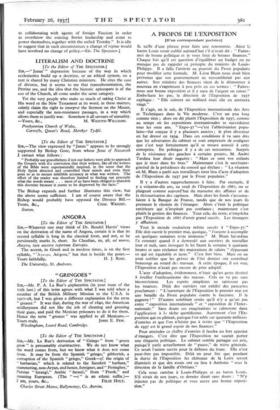MOSCOW TRIALS [To-the Editor' of THE SPECTATOR.]
SIR,—After the Kamenev-Zinoviev trial you referred to the shooting of " old Bolsheviks" in Moscow. In a letter which you printed, later confirmed in an excellent article by Sir. Bernard Pares, I pointed out that these people were not the heroes of the Revolution which you suggested. Now, after another important trial, you repeat the error which you made last time. " When these have been disposed of," .you write, " the Revolution will have devoured all except Stalin of those . who fought and suffered for it."
May I respectfully point out that all the outstanding leaders of the Soviet Government today are old Bolsheviks who fought and suffered together with Lenin ? Kalinin, President of the U.S.S.R. ; Molotov, Chairman of the Council of People's Commissars ; Ordjonikidze, Commissar for Heavy Industry ; Voroshilov, Commissar for Defence—these are all loyal Bolsheviks who worked under Lenin's leadership. How can you ignore such facts in your bitter attack on the Soviet Government ?
And to take the other people you mention—Radek, Piatakov, Bukharin, and so on. Are you aware that these men, in 1918, formed the group known as the " Left Communists " which opposed Lenin for what you would call the " limits " he set to the Russian Revolution ? Further, are you aware that at that time they were informed of a conspiracy for the armed overthrow of the Soviet Government and the arrest of Lenin ? And are you aware that they kept a conspiratorial silence on this until 1923, when Bukharin admitted that they had known of this counter-revolutionary plot in 1918 and had kept it a secret ?
It is indeed horrible to have to drag up the past of these men, but the fault lies with those who, through ignorance or malice, now try to canonise them as the great heroes of the Russian Revolution.
You go on to say that the " one crime " of these men " is to have wished to continue the Revolution beyond the limits set to it by Stalin." Have you, Sir, read the reports of the trial ?
In the Daily Herald Mr. Dudley Collard, a British barrister, states his conviction of the guilt of the accused. In the News Chronicle a distinguished foreign diplomat is quoted as stating his conviction, after much exp.trience of courts of law, that the accused were guilty, and the correspondent of the Daily Telegraph, usually loath to admit anything in the favour of the Soviet Government, states that he was convinced that- " seditious correspondence " had been undertaken with Trotsky, and that espionage had taken place.
Not one of the charges dealt with mere opposition to Stalin's policy. The charges were of preparing terrorist acts, wrecking and sabotage in industry, and espionage in the interests of foreign Powers. Radek and the others pleaded guilty to collaborating with agents of foreign Fascism in order to overthrow the existing Soviet leadership and come to power themselves, together with the exiled Trotsky. But nowhere, in the trial or in Trotsky's lengthy statements to the Press, has there been a suggestion of a policy more revolutionary, more in the interests of the people, than that of Stalin and the present leadership in the U.S.S.R.
Whatever you may think of Soviet juridical procedure, which is more like that of the Continent than that of Britain, there is absolutely no justification for your statement that " only. Stalin remains." And there is still less justification for the way in which you have completely ignored the real crimes of the accused, covering them up with a suggestion that they were simply " more revolutionary " than Stalin.
I trust that you will print this letter from at least one reader who is indignant at your misrepresentation. of this trial of men who have admitted that they were collaborating with Fascist agents against -the security- of the -U.S.S.R.—
22 St. George's Mansions, Red Lion Square,W.C. r. -
[The split between Trotsky and Stalin was on a clear issue of policy—whether the immediate objective should be world- revolution or the consolidation of the Russian revolution. Mr. Sloan admits that " Radek and the others pleaded guilty to collaborating with agents of foreign Fascism in order
to overthrow the existing Soviet leadership and come to power themselves, together with the exiled Trotsky." It is idle to suggest that in such circumstances a change of regime would
have involved no change of policy.—En. The Spectator.]



















































 Previous page
Previous page